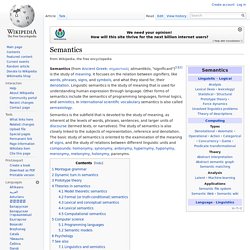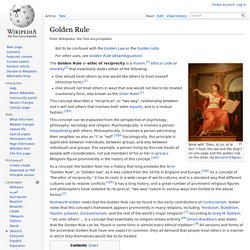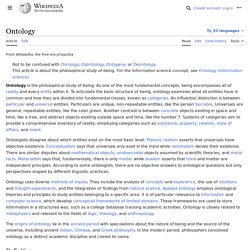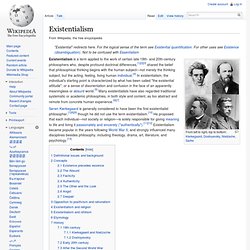

Semantics. Montague grammar[edit] In the late 1960s, Richard Montague proposed a system for defining semantic entries in the lexicon in terms of the lambda calculus.

In these terms, the syntactic parse of the sentence John ate every bagel would consist of a subject (John) and a predicate (ate every bagel); Montague demonstrated that the meaning of the sentence altogether could be decomposed into the meanings of its parts and in relatively few rules of combination. The logical predicate thus obtained would be elaborated further, e.g. using truth theory models, which ultimately relate meanings to a set of Tarskiian universals, which may lie outside the logic.
The notion of such meaning atoms or primitives is basic to the language of thought hypothesis from the 1970s. Despite its elegance, Montague grammar was limited by the context-dependent variability in word sense, and led to several attempts at incorporating context, such as: Golden Rule. Book with "Dieu, la Loi, et le Roi" ("God, the law and the king") on one page and the golden rule on the other, by Bernard d'Agesci.

One should treat others as one would like others to treat oneself (directive form).[1]One should not treat others in ways that one would not like to be treated (cautionary form, also known as the Silver Rule).[1] This concept describes a "reciprocal", or "two-way", relationship between one's self and others that involves both sides equally, and in a mutual fashion.[3][4] This concept can be explained from the perspective of psychology, philosophy, sociology and religion. Psychologically, it involves a person empathizing with others. Nihilism. Nihilism is also a characteristic that has been ascribed to time periods: for example, Jean Baudrillard and others have called postmodernity a nihilistic epoch,[4] and some Christian theologians and figures of religious authority have asserted that postmodernity[5] and many aspects of modernity[3] represent a rejection of theism, and that such rejection of their theistic doctrine entails nihilism.

Forms of nihilism[edit] Nihilism has many definitions, and thus can describe philosophical positions that are arguably independent. [edit] Metaphysical nihilism is the philosophical theory that there might be no objects at all—that is, that there is a possible world where there are no objects at all—or at least that there might be no concrete objects at all—so that even if every possible world contains some objects, there is at least one that contains only abstract objects. Epistemological nihilism[edit] Mereological nihilism[edit] This interpretation of existence must be based on resolution. Ontology. Study of the nature of being, becoming, existence or reality, as well as the basic categories of being and their relations Parmenides was among the first to propose an ontological characterization of the fundamental nature of reality.

Etymology[edit] While the etymology is Greek, the oldest extant record of the word itself, the New Latin form ontologia, appeared in 1606 in the work Ogdoas Scholastica by Jacob Lorhard (Lorhardus) and in 1613 in the Lexicon philosophicum by Rudolf Göckel (Goclenius). The first occurrence in English of ontology as recorded by the OED (Oxford English Dictionary, online edition, 2008) came in a work by Gideon Harvey (1636/7–1702): Archelogia philosophica nova; or, New principles of Philosophy. Skepticism. Skepticism or scepticism (see American and British English spelling differences) is generally any questioning attitude towards knowledge, facts, or opinions/beliefs stated as facts,[1] or doubt regarding claims that are taken for granted elsewhere.[2] Philosophical skepticism is an overall approach that requires all information to be well supported by evidence.[3] Classical philosophical skepticism derives from the 'Skeptikoi', a school who "asserted nothing".[4] Adherents of Pyrrhonism, for instance, suspend judgment in investigations.[5] Skeptics may even doubt the reliability of their own senses.[6] Religious skepticism, on the other hand, is "doubt concerning basic religious principles (such as immortality, providence, and revelation)".[7] Definition[edit] In ordinary usage, skepticism (US) or scepticism (UK) (Greek: 'σκέπτομαι' skeptomai, to think, to look about, to consider; see also spelling differences) refers to:
Existentialism. Existentialism is a term applied to the work of certain late 19th- and 20th-century philosophers who, despite profound doctrinal differences,[1][2][3] shared the belief that philosophical thinking begins with the human subject—not merely the thinking subject, but the acting, feeling, living human individual.[4] In existentialism, the individual's starting point is characterized by what has been called "the existential attitude", or a sense of disorientation and confusion in the face of an apparently meaningless or absurd world.[5] Many existentialists have also regarded traditional systematic or academic philosophies, in both style and content, as too abstract and remote from concrete human experience.[6][7] Definitional issues and background[edit] There has never been general agreement on the definition of existentialism.

The term is often seen as an historical convenience as it was first applied to many philosophers in hindsight, long after they had died. Concepts[edit]
Catholicism. Greek.